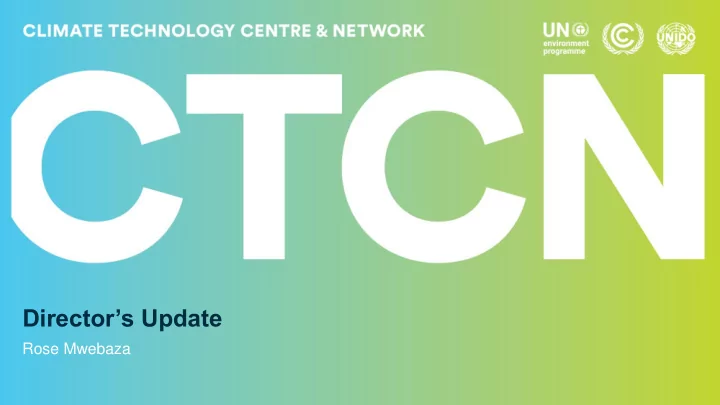

Director’s Update Rose Mwebaza
UN Framework Convention on Climate Change Technology Mechanism Hosted by:
CTCN Network: 564 members, over 90 countries
Top 10 countries with the highest number of members 33% of network members located in Asia-Pacific and Europe, 10% are based in Africa. Number of network members South Africa 15 Netherlands 15 France 19 India 21 United 26 Kingdom Canada 26 Germany 27 Spain 31 United States 35 South Korea 69
Type of organizations in the Network Network members by type of organizations 3 1 3 Private sector organization 11 10 7 38 Research and academic institution Non-governmental organisation 40 Not for profit organisation 260 Public sector organisation 58 Intergovernmental organisation Partnership Financial institution Initiative 119 Regional organisation
Technical expertise of the Network
Network analysis Do we have sufficient resources in responding to requests? • Compared to a relatively high number of technical assistance requests, there is a lower Network presence in: • (sector) Agriculture and Forestry, Transport, Carbon fixation and abatement • (cross-sectoral enablers) Economics and financial decision-making • (approach) Gender, Endogenous technologies
Adapting our work during COVID-19
Trends in CTCN technology demand Distribution of requests by geographical scope 71.8%: National 19.4%: Sub-national Distribution of requests by type of assistance 28.3%: Decision making tools and/or information provision 20.3%: Feasibility of technology options 15.6%: Technology identification and prioritisation 10.1%: Sectoral roadmaps and strategies
Updates: Technical assistance ❑ Ongoing technical assistance: ❑ Much work is continuing to move forward ❑ However, some important stakeholder consultations (especially in rural areas) are proving challenging ❑ Governments are in some cases adopting a wait and see policy ❑ Contracts are being updated to reflect this ❑ Requests: ❑ Number of requests is down in comparison to same time last year ❑ Secretariat analysing country programmes, NDCs and collaborating with NDEs to develop new requests so a pipeline is being built and maintained
Updates: Capacity building • CTCN Regional Forums at UNFCCC Climate Weeks • Workshops to support industrial SMEs in adopting climate-friendly technologies • Secondment Programme • Webinar programme • Capacity building also incorporated into majoring of technical assistance cases
Updates: Knowledge sharing • CTCN knowledge portal is now one of the world’s largest online source of climate technology information in the world • 70% increase in users over the past year • Joint knowledge resources including: • technical briefs • roadmaps • recommendations • and other climate technology guidance
Updates: Communications • CTCN website: 126,361 users, 8.63 million impressions since January 2020 • CTCN newsletters: 17,784 subscribers • CTCN Twitter and Facebook accounts: 10,5 million impressions on social media since January 2020 • CTCN in the media: 437 media mentions since January 2020
Partnerships and support for technical assistance Small Grant Aggregator: selected CTCN/UNEP and UNDP to jointly manage a new $10 million-dollar pilot adaptation innovation programme ($5 million USD) Challenge Program for Adaptation Innovation: CTCN to help mid-size cities access innovative financing for climate adaptation technologies ($677,000 USD) GCF Readiness Programme: CTCN supported more than 20 countries in formulation of GCF Readiness proposals for submission. 16 have been approved thus far. ( ~ $5 million USD) Climate Action Enhancement Package: The CTCN supporting 7 countries. Some CAEP funds will be provided to the CTCN for technical assistance implementation, while the CTCN will co-finance, and in some cases completely finance, the remainder of individual technical assistance costs. ($585,000 USD) Pro bono support: The Republic of Korea provided pro bono support to four technical assistance projects in 2019 ($419,948 USD)
Opportunities for engagement
Opportunities • Technical assistance (funded by the CTCN, pro- bono, etc.) • Capacity building (presenting online and in-person tutorials; workshops on your fields of expertise to peers and developing country stakeholders, etc.) • Knowledge sharing (data, lessons learned, reports, case studies, joint webinars, knowledge resources, etc.) • Visibility (joint articles on CTCN website and in the media, CTCN newsletters, CTCN Twitter and Facebook accounts, joint events, etc.)
Recommend
More recommend